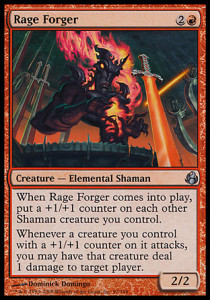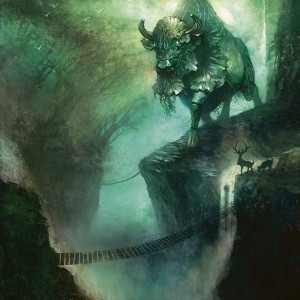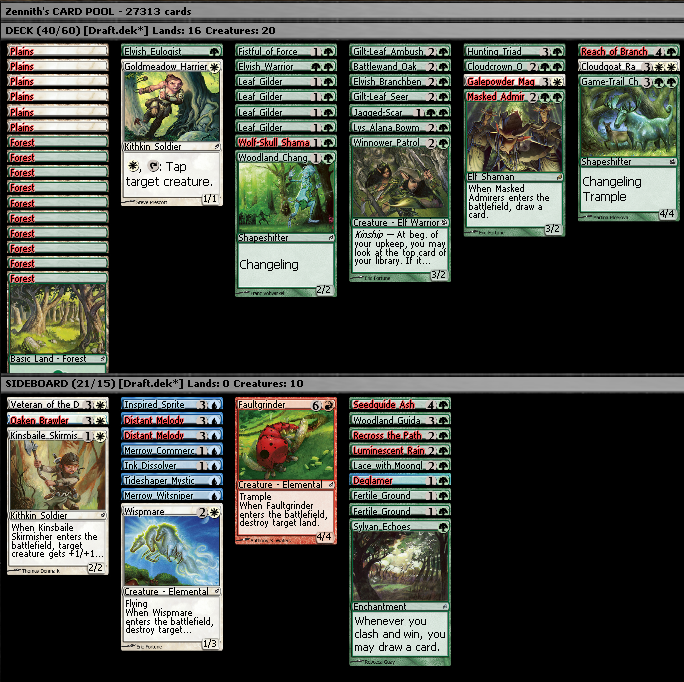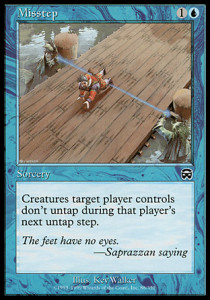Journey to Nyx is out! Well, the cards are. The set releases in just three days. I’ve heard nothing but great things about it. I’ve unfortunately got no stories to share, as I never made it to prerelease (my weekend was very fun but very busy). I did, however, have time to enjoy some Flashback Lorwyn Drafts on MODO.
Lorwyn released in October of 2007. It was the second tribal block and was far more devoted to tribes than 2002’s Onslaught (the first tribal block, which had morph and cycling-matters to go along with its fewer and looser tribes), going so far as to introduce the short-lived Tribal card type. Lorwyn also introduced the Planeswalker card type (which was foreshadowed in the Future Sight’s [casthaven]Tarmogoyf[/casthaven]).
The complexity of Lorwyn was exceptionally high. It was released in the wake of Time Spiral, the most complicated Limited format in Magic history (Odyssey was pretty complex, too). Wizards, aware that Time Spiral had gone too far, shifted the complexity of cards from their text boxes to their card types. This led to far more complicated board states in which each player needed to know the precise creature types of every creature on the battlefield, in their hand, and on the tops of their libraries (thanks to the mechanics clash and kinship). Card’s artwork was deceptive, in that while it conveyed a card’s ‘race’ (such as faerie or goblin) well, it did not represent its ‘class’ (such as soldier or knight) well. This made knowing all creature types more difficult. Lorwyn’s complexity received a generally poor response (as did its its gorgeous, playful, fairy tale artwork), which would eventually lead to a diminished amount of complexity on common cards (also known as New World Order).
Lorwyn was also the very first set I’d bought a booster of since Prophecy. I was studying abroad in Japan at the time. One day, a friend and I went went to Osaka’s Denden Town and ended up in a hobby shop. We were pleasantly surprised to see that Magic was not only still in business, but popular. I bought a Japanese booster pack (opened a [casthaven]Knucklebone Witch[/casthaven]) and an English tournament pack. The latter contained a [casthaven]Liliana Vess[/casthaven], which confused and frustrated me, since planeswalkers like Urza, Teferi, and we, the players, were essentially gods and too mighty to be reduced to a lowly card. Turns out, The Mending had changed all of that. 2007 Zach didn’t know that, decided that the game still wasn’t for him, and having seen his own shadow, decided to spend three more years not playing.
Yesterday morning, I drafted Gw Elves. I elected to splash a color due to the meager final cards green provided. White’s cards were more overtly powerful than blue’s two copies of [casthaven]Distant Melody[/casthaven] (which would only work when I had a solid board presence—in other words, when I was probably winning already).
In the first round, one of my viewers informed me that I was playing against one of the best Limited players on Magic Online. My opponent had a good looking U/B Merfolk/Faeries/Rogues deck with [casthaven]Forced Fruition[/casthaven]. In our first game, I clicked through my precombat main phase, failing to play a forest for my [casthaven]Battlewand Oak[/casthaven] (which couldn’t attack otherwise and which I needed to be attacking with). Two turns in a row. I failed to attack when I would have left my opponent all but dead. I almost died to [casthaven]Forced Fruition[/casthaven] because I’d not been applying pressure. In short, I wasn’t playing my best.
I know that I’m rusty. I’ve hardly played Magic this past month. I’m distracted by issues outside the world of gaming. I’m anxious that I won’t be able to pull my weight when the next season of Team Draft League starts. I’ve got plenty of excuses for making mistakes. But excuses don’t excuse mistakes.
I’m a better player than I used to be because I don’t let my mistakes control me. I misclick? Fine, I won’t next time. I did it again? I’ll be more careful. I did my math wrong? I’ll double check my work as my opponent takes her turn. I lost because I missed an attack, or walked into a combat trick, or flooded out, or didn’t mulligan? I’ll reflect on how I made my decisions. I’ll talk with my viewers, who always have a different perspective.
What I won’t do, what I can’t do, is get angry. When I get angry, I lose focus, make more mistakes, and make worse mulligans. Accordingly, I don’t blame my opponent, curse the shuffler, and I don’t rage at myself. I take for granted that I’m a good Magician and I won’t doubt that when I’m playing. I can’t stress this enough—confidence is critical in not just Magic, but life. When I’m in the middle of an improv show, or biking down Second Avenue, I can’t stop to doubt what I’m doing. I’ll fall out of the scene or worse, into traffic. When the curtain goes down, when the light goes red, and when I’m shuffling up, that’s when it’s good to stop, to reflect, and even to doubt. There’s nothing on the line then.
 After those mistakes, I won the first round, beat a spectacular Kithkin skies deck in round two, and split the finals with the QP (’cause dogs need walks and I’ll take a guaranteed QP to help me get a [casthaven]Force of Will[/casthaven]). It felt good to win and to do so in spite of suboptimal play—I’ve got room to improve, which is a good feeling to have.
After those mistakes, I won the first round, beat a spectacular Kithkin skies deck in round two, and split the finals with the QP (’cause dogs need walks and I’ll take a guaranteed QP to help me get a [casthaven]Force of Will[/casthaven]). It felt good to win and to do so in spite of suboptimal play—I’ve got room to improve, which is a good feeling to have.
—Zachary Barash
Zachary Barash has been playing Magic on and off since 1994. He loves Limited and drafts every available format (including several that aren’t entirely meant to be drafted). He’s a proud Cube owner and performer, improvising entire musicals every week with his team, Petting Zoo. Zach has an obsession with Indian food that borders on being unhealthy.




